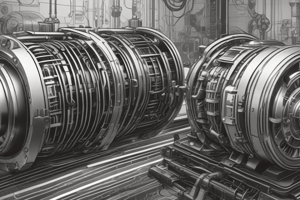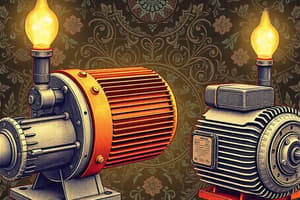Podcast
Questions and Answers
What is the primary function of electrical motors?
What is the primary function of electrical motors?
To convert electrical energy into mechanical energy.
Explain the distinction between induction motors and synchronous motors.
Explain the distinction between induction motors and synchronous motors.
Induction motors rely on electromagnetic induction for rotation, while synchronous motors maintain a fixed speed-to-frequency ratio.
What are the key advantages of DC motors over AC motors?
What are the key advantages of DC motors over AC motors?
DC motors offer precise speed control and controllable torque.
Describe how a transformer functions in an electrical circuit.
Describe how a transformer functions in an electrical circuit.
What is the role of core material in transformers?
What is the role of core material in transformers?
How does the speed control mechanism differ between AC and DC motors?
How does the speed control mechanism differ between AC and DC motors?
What benefits do brushless DC motors offer compared to brushed DC motors?
What benefits do brushless DC motors offer compared to brushed DC motors?
Explain the purpose of impedance matching in transformers.
Explain the purpose of impedance matching in transformers.
Flashcards
Electrical Motor
Electrical Motor
A device that converts electrical energy to mechanical energy.
AC Motor
AC Motor
An electric motor that operates using alternating current.
DC Motor
DC Motor
An electric motor that operates using direct current.
Induction Motor
Induction Motor
Signup and view all the flashcards
Transformer
Transformer
Signup and view all the flashcards
Step-Up Transformer
Step-Up Transformer
Signup and view all the flashcards
Step-Down Transformer
Step-Down Transformer
Signup and view all the flashcards
AC Motor Speed
AC Motor Speed
Signup and view all the flashcards
Study Notes
Introduction to Electrical Motors
- Electrical motors convert electrical energy into mechanical energy. This is a fundamental process in many applications.
- Different types of motors exist, categorized by their construction and operating principles.
- Key characteristics include speed, torque, power output, and efficiency.
- Motor selection depends on the specific application's requirements.
AC Motors
- AC motors operate on alternating current.
- Induction motors are a common type of AC motor.
- Induction motors rely on electromagnetic induction to produce rotation.
- They are robust, relatively inexpensive, and widely used in various applications.
- Synchronous motors maintain a constant speed-to-frequency ratio.
- They are often used in situations requiring precise speed control.
DC Motors
- DC motors operate on direct current.
- They offer more precise speed control compared to AC motors.
- Several types of DC motors exist, including brushed and brushless types.
- Brushed DC motors use commutators to switch current flow generating torque.
- Brushless DC motors use electronic controllers, offering advantages in efficiency and maintenance.
- Controllable speed and torque are often significant advantages of DC motors.
Transformer Basics
- Transformers are devices used to change voltage levels in AC circuits.
- They work by electromagnetic induction between coils.
- Transformers have a primary and secondary coil.
- Transformers do not change the frequency of the AC.
- Energy efficiency in transformer design is critical.
- A transformer's core material plays a role in minimizing energy loss.
- Step-up transformers increase voltage, while step-down transformers decrease it.
- Efficiency and power handling ability are crucial in practical applications.
- Transformers are vital for power transmission and distribution systems, matching voltage with load requirements.
- Impedance matching is crucial for efficient power transfer.
Key Differences between AC and DC Motors
- AC motors are typically more robust and inexpensive than DC motors.
- DC motors offer finer control over speed.
- AC motor speed is generally more directly tied to supply frequency.
- DC motor speed is typically regulated by varying the voltage or field.
- Applications often dictate the best choice, factoring in cost, control, and robustness requirements.
- The type of load and its characteristics influence optimal motor selection.
Studying That Suits You
Use AI to generate personalized quizzes and flashcards to suit your learning preferences.
Description
This quiz covers the basics of electrical motors, including their operation, types, and key characteristics. You'll explore both AC and DC motors, their applications, and factors influencing motor selection. Test your knowledge on motor mechanics and efficiency.





